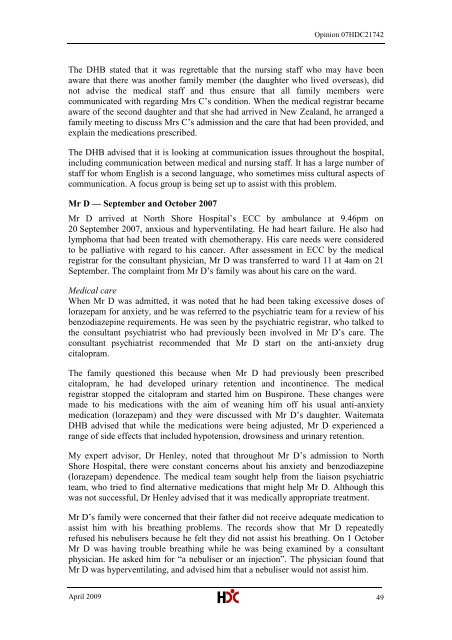North Shore Hospital report - New Zealand Doctor
North Shore Hospital report - New Zealand Doctor
North Shore Hospital report - New Zealand Doctor
Create successful ePaper yourself
Turn your PDF publications into a flip-book with our unique Google optimized e-Paper software.
Opinion 07HDC21742The DHB stated that it was regrettable that the nursing staff who may have beenaware that there was another family member (the daughter who lived overseas), didnot advise the medical staff and thus ensure that all family members werecommunicated with regarding Mrs C‘s condition. When the medical registrar becameaware of the second daughter and that she had arrived in <strong>New</strong> <strong>Zealand</strong>, he arranged afamily meeting to discuss Mrs C‘s admission and the care that had been provided, andexplain the medications prescribed.The DHB advised that it is looking at communication issues throughout the hospital,including communication between medical and nursing staff. It has a large number ofstaff for whom English is a second language, who sometimes miss cultural aspects ofcommunication. A focus group is being set up to assist with this problem.Mr D — September and October 2007Mr D arrived at <strong>North</strong> <strong>Shore</strong> <strong>Hospital</strong>‘s ECC by ambulance at 9.46pm on20 September 2007, anxious and hyperventilating. He had heart failure. He also hadlymphoma that had been treated with chemotherapy. His care needs were consideredto be palliative with regard to his cancer. After assessment in ECC by the medicalregistrar for the consultant physician, Mr D was transferred to ward 11 at 4am on 21September. The complaint from Mr D‘s family was about his care on the ward.Medical careWhen Mr D was admitted, it was noted that he had been taking excessive doses oflorazepam for anxiety, and he was referred to the psychiatric team for a review of hisbenzodiazepine requirements. He was seen by the psychiatric registrar, who talked tothe consultant psychiatrist who had previously been involved in Mr D‘s care. Theconsultant psychiatrist recommended that Mr D start on the anti-anxiety drugcitalopram.The family questioned this because when Mr D had previously been prescribedcitalopram, he had developed urinary retention and incontinence. The medicalregistrar stopped the citalopram and started him on Buspirone. These changes weremade to his medications with the aim of weaning him off his usual anti-anxietymedication (lorazepam) and they were discussed with Mr D‘s daughter. WaitemataDHB advised that while the medications were being adjusted, Mr D experienced arange of side effects that included hypotension, drowsiness and urinary retention.My expert advisor, Dr Henley, noted that throughout Mr D‘s admission to <strong>North</strong><strong>Shore</strong> <strong>Hospital</strong>, there were constant concerns about his anxiety and benzodiazepine(lorazepam) dependence. The medical team sought help from the liaison psychiatricteam, who tried to find alternative medications that might help Mr D. Although thiswas not successful, Dr Henley advised that it was medically appropriate treatment.Mr D‘s family were concerned that their father did not receive adequate medication toassist him with his breathing problems. The records show that Mr D repeatedlyrefused his nebulisers because he felt they did not assist his breathing. On 1 OctoberMr D was having trouble breathing while he was being examined by a consultantphysician. He asked him for ―a nebuliser or an injection‖. The physician found thatMr D was hyperventilating, and advised him that a nebuliser would not assist him.April 2009 49
















